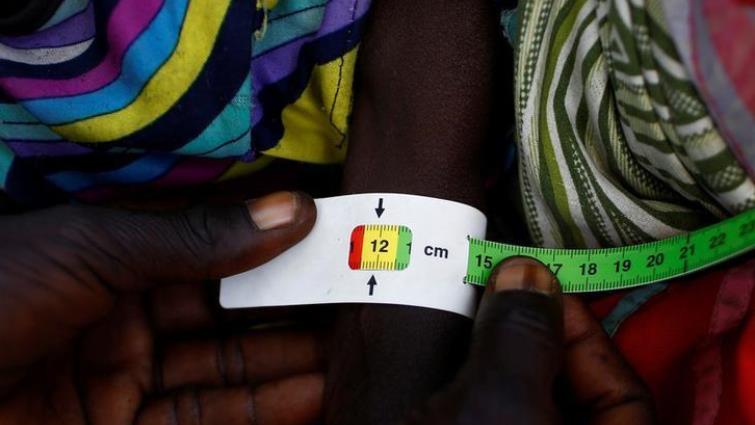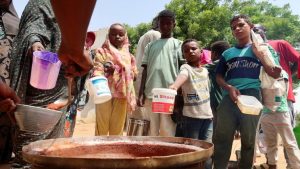Acute malnutrition level among children exceeds emergency threshold
In spite of a slight improvement in the food security situation since June 2019, more than half the population of South Sudan – some 6.35 million people – do not know where their next meal will come from, three United Nations agencies warned today.
According to an Integrated Food Security Phase Classification (IPC) update, released jointly by the Government of the Republic of South Sudan, the Food and Agriculture Organization of the United Nations (FAO), the United Nations Children’s Fund (UNICEF) and the World Food Programme (WFP), 54 percent of people in South Sudan are still severely food insecure.
The report estimates that 10 000 people are currently in Catastrophe (IPC Phase 5) and facing an extreme lack of food, while about 1.7 million are in Emergency (IPC Phase 4) and another 4.6 million people are experiencing Crisis (IPC Phase 3) levels of acute food insecurity.
While the Greater Upper Nile region continues to be the most food insecure, followed by the Greater Bahr el Ghazal region, those in Catastrophe are in Yirol East of the former Lakes state and will need urgent humanitarian support to save their lives.
Peace can improve access to livelihoods, markets and humanitarian assistance
Although the food security situation is severe, the recent improvement can largely be attributed to the Revitalized Peace Agreement (R-ARCSS), signed in September 2018. The decrease in armed conflict has encouraged the voluntary return of farmers, increasing access to livelihoods and improving markets. A more stable political environment has also allowed for improved delivery of humanitarian assistance to the most vulnerable populations.
“With political stability and sustained peace, South Sudan could quickly recover from the crisis and boost its food production. The IPC findings are still alarming, but they also show that the revitalized peace agreement is bearing dividends and its full implementation is of utmost significance for the country,” said Meshack Malo, FAO Representative in South Sudan. “FAO is working with returning farmers to assist them resettle, build their livelihoods and produce their own food”.
Alarming levels of acute malnutrition
Acute malnutrition levels among children under five years of age have increased significantly, from 13 percent in 2018 to 16 percent in 2019 – which is above the emergency threshold of 15 percent. It is estimated that 1.3 million children will be affected by acute malnutrition in 2020.
“The increase in acute malnutrition among children in South Sudan tells us how complex malnutrition is but also how much longer it takes to rebuild a country, compared to shattering it,” said Mohamed Ag Ayoya, UNICEF Representative in South Sudan. “This situation calls for a paradigm shift, putting prevention first, before scaling up treatment. This shift includes promotion of age appropriate complementary feeding for children, prevention of malaria and diarrhoea, access to clean water, proper hygiene, and health care. Only then can children truly thrive.”
Persistent high levels of hunger
The food security situation in South Sudan is expected to improve from now and towards the end of the year, as seasonal harvests become available. However, the UN agencies estimate that 4.5 million people will still face Crisis, Emergency or Catastrophe levels of food insecurity and will need assistance.
“The latest report goes to show that if you give peace a chance, you are likely to make food security a reality,” said Matthew Hollingworth, WFP’s Country Director in South Sudan. “Now is not the time to rest on our laurels as millions of people are still struggling to survive in the country. Rather, we need to re-double our efforts and maintain the gains that peace has enabled.”
Responding to the crisis
FAO is providing starter kits that consist of crop seeds suited to local conditions, agricultural tools, fishing equipment and cash-based interventions with the goal of closing the food gap for some 1 million farming households. Additionally, FAO is carrying out extensive animal vaccination and treatment to support some 7 million livestock keepers, protecting their livelihoods and opening market opportunities.
UNICEF and 40 civil society organizations are providing key nutrition interventions for children and women in South Sudan. Currently, UNICEF is supporting 1 150 outpatient therapeutic programme (OTP) centres and 99 stabilization centres across South Sudan. From January to July 2019, more than 144 000 children affected by severe acute malnutrition were treated with high quality services, of whom more than 90 percent have successfully recovered. Moreover, UNICEF will scale up its promotion of adequate complementary feeding for children and prevention of malaria and diarrhoea. Strong collaboration with the WASH, health, education and agriculture sectors tackling some of the root causes of malnutrition continues to be a priority for UNICEF.
WFP and partners have responded with food and cash distributions in the worst-affected areas and have so far this year reached some 3.9 million vulnerable people. With enough resources, WFP will provide up to 5.1 million people with a variety of support, including life-saving food and cash distributions in areas with working markets, food in return for work on the construction and rehabilitation of community assets, and food for school meals. Of this, WFP will provide special products for the prevention and treatment of malnutrition to some 1.6 million children and pregnant or breastfeeding women.
– JOINT FAO/UNICEF/WFP NEWS RELEASE






